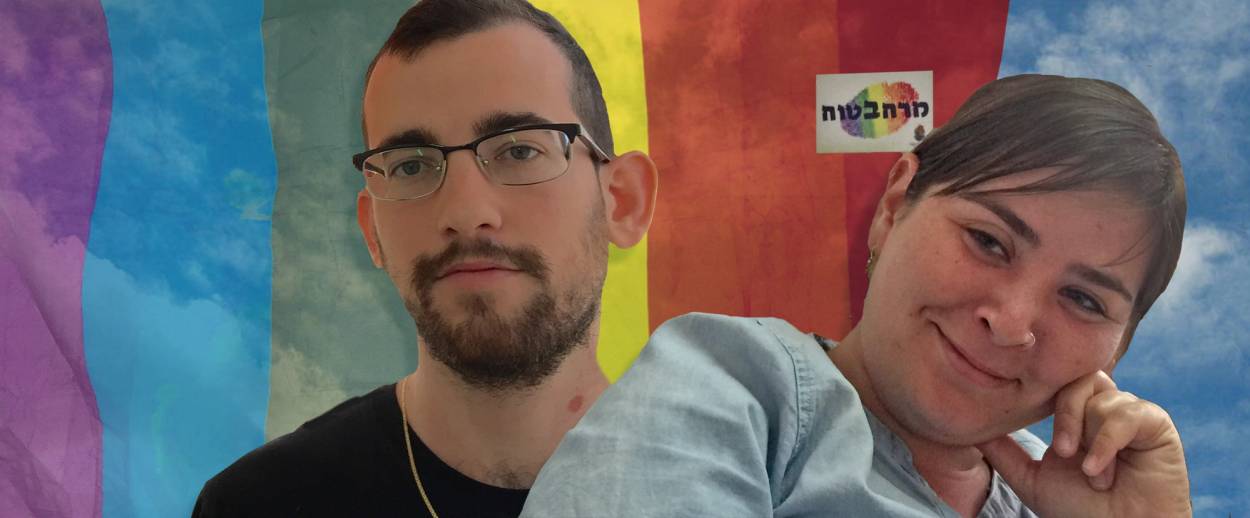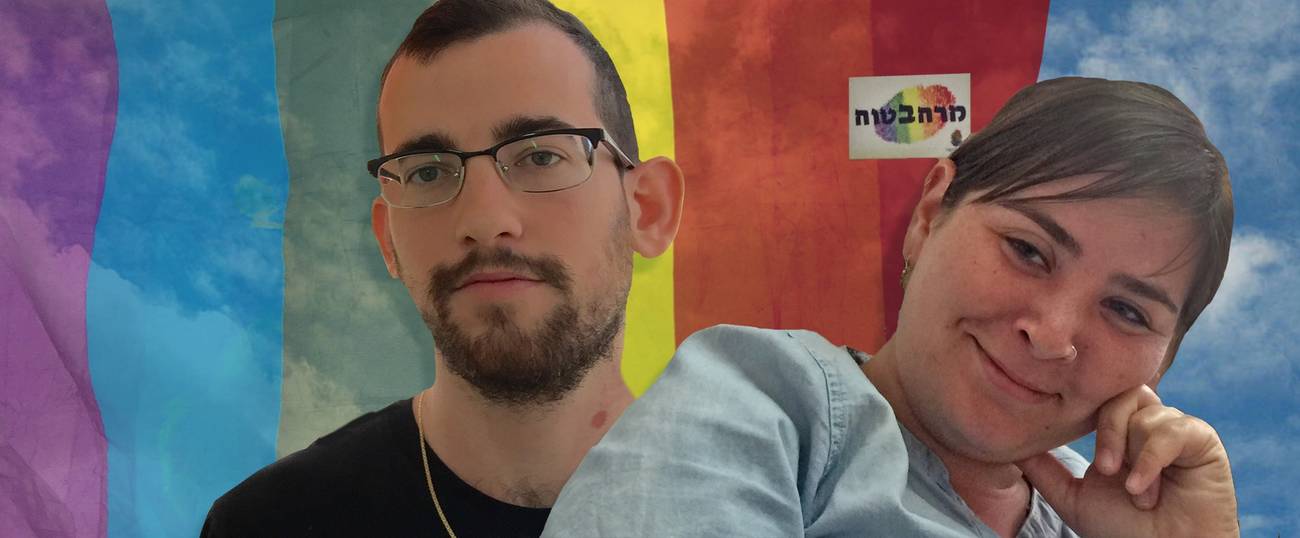Panic in Cleveland, Gay Pride in Jerusalem
Returning to the scene of last year’s hate-motivated stabbing, as the Holy City again celebrates all forms of sexuality and gender




Noam Eyal was walking down Keren Hayesod street surrounded by fellow activists from the feminist student group Yerushlamiyot, when he felt something heavy push against his back. It was June 2015, and this was his third gay parade in downtown Jerusalem. Eyal had just crossed a small group of right-wing activists demonstrating behind a line of policemen near Paris Square, and was feeling less edgy as the crowd dissipated.
“I looked up and saw my friend’s terrified face, then looked at myself and noticed I was covered in blood. An ultra-Orthodox man was lunging forward,” Eyal, then a 30-year-old political science student at Hebrew University recalled. “I immediately realized I had been stabbed in the back.”
The attack came as no surprise to Eyal. Earlier that year, he had screened a documentary film, Jerusalem is Proud to Present, about the preparations for World Pride in Jerusalem in 2006. The film presented a traumatized city convalescing from a stabbing attack carried out the previous year by an extremist ultra-Orthodox man, Yishai Schlissel, who had moderately wounded three marchers with a kitchen knife he borrowed from a friend. Eyal’s stabber seemed eerily familiar: He was the same man.
On June 26, Schlissel was sentenced by the Jerusalem District Court to life in prison plus 31 years for murdering 16-year-old Shira Banki and injuring six others, including Eyal, last year. But the Jerusalem activist said the ruling gave him no sense of closure. “A dangerous man is now behind bars, but from a social point of view it’s meaningless,” he said. “The real test for Israelis is the upcoming parade. If the number of people showing up this year isn’t four times higher, it will send a clear message to future attackers.”
***
Israel uses its relative tolerance and inclusion of the LGBT community to advance a positive image worldwide. Tel Aviv Pride, which drew a record 200,000 participants including 35,000 tourists May 31, was aggressively promoted by the Ministry of Foreign Affairs and the local municipality, which produced and funded the event. But if Tel Aviv’s Gay Pride was a massive beach party celebrating Israel’s secular, smiling face, Jerusalem’s annual event, scheduled this year for July 21, is a political and social call to action by a minority group feeling ostracized and under threat.
“It’s hypocritical for Israel to market its fine treatment of gays,” said Eyal, who insists on returning to this year’s Jerusalem parade to convey his message. “Everything outside of Tel Aviv is ex-territorial. We have no right to boast about that. The [LGBT] community exists everywhere in the country, but the fact that so many people remain in the closet reflects a deep problem of tolerance.”
In his office in the Jerusalem Open House (JOH), Tom Canning displays a charred rainbow flag, burnt on a balcony this year in one of the city’s southern neighborhoods. Canning is associate director of the community center, which serves as a one-stop shop for the local LGBT community, providing everything from HIV testing to social activities for teenagers, as well as financial and emotional support for Arab and ultra-Orthodox members of the community rejected by their families.
“At first, there was terrible anger within our community: At the religious, at city hall, at all the homophobes,” recalls Canning, 28, who narrowly escaped Schlissel’s knife last year. “On the one hand we wanted to protest, but on the other we didn’t want the discussion to become one of violence and de-legitimization. We wanted rehabilitation. We wanted to show the public in Jerusalem and in Israel that there’s a problem, that Israel is more than just Tel Aviv.”
Following the stabbing, representatives from the Jerusalem Open House met with some 20 rabbis and local community leaders. Canning said he sensed newfound openness to listen and acknowledge the deep-seated intolerance within the religious camp. At a mass rally held in Jerusalem’s Zion Square last August, Rabbi Benny Lau declared that homophobia within the community begins with conversations “at home, in our youth movements, in our schools.”
“We must take responsibility,” Lau implored the gathering. “No one should live in the closet. The closet is death!”
Two days after the stabbing, Education Minister Naftali Bennett requested a meeting with Canning and his colleagues. The National Religious politician promised to support the Open House and the Jerusalem gay community.
“This was a revolutionary statement,” Canning said. “It ended up having no effect on the ground, but as far as we were concerned it had great symbolic significance.”
Following Banki’s murder, the municipality augmented JOH’s budget by some $60,000, a 30 percent increase. But in stark contrast to Tel Aviv, the LGBT community’s cooperation with city hall remains an uphill battle. For years, the organization has been fighting the municipality in court for adequate funding, and still receives no municipal support for the annual parade. In 2005, it took the supreme court to force city hall to hang rainbow flags along the route of the parade.
Canning would like to see Jerusalem mayor Nir Barkat act more like his Tel Aviv counterpart, Ron Huldai, and attend his city’s parade for the first time—or at least visit the Open House, located some 100 yards from his office. “We want a city hall that is proud of us, that embraces as, that views us as part of the development plan for this city,” he said. “The parade is nowhere to be found on the municipal website or on street billboards.”
Perhaps the most sensitive mission carried out by the Jerusalem Open House is its work with youth. Hadas Bloemendal, who came out to her Orthodox parents nearly a decade ago as a soldier, was busy setting up community centers for LGBT youth across Israel when the attack took place last year. Now the coordinator of JOH’s educational and youth activities, Bloemendal says Banki’s murder drove home a sense of urgency in working on education specifically in Jerusalem. Some 100 teenagers regularly attend activities at JOH, but many more—especially from the city’s sizable ultra-Orthodox and Arab communities—are in touch with her over the phone, unwilling to expose their identities.
“For me, it was a conscious decision to live here, even though I’m gay and even though Jerusalem is challenging and very religious,” Bloemendal said. “There’s almost no sex education in the city, let alone a discussion of LGBT issues.”
Late last year, Bloemendal finished developing an educational kit, which she is cautiously attempting to introduce into Jerusalem schools. In class, she discusses coming out to parents with students who often know little or nothing about her community. Once, during a presentation in the sole religious-school classroom she was allowed into, a senior wearing a huge yarmulke challenged her in a manner she considered “borderline homophobic.”
“At the last hour of the meeting, he revealed to us that his uncle is gay. He said he never dared ask him about it, because it’s so personal and his family is so judgmental. But since we came from the outside and he doesn’t know us or care what we think about him, he said, he felt more free to express himself. […] It’s hugely important to allow real, untainted dialogue about these issues.”
Recently, Bloemendal was able to speak to an even trickier demographic in the city: a group of 30 ultra-Orthodox social workers. She told them of the suffering of closeted ultra-Orthodox teenagers who contact her anonymously from yeshivas and seminaries using blocked phone numbers. Following her presentation, half the group took her business card while the others asked for more details on her activities.
“They weren’t surprised, but were mostly very sad. They realized that LGBT community members don’t feel comfortable enough to turn to them, and rightly so. They admitted they wouldn’t know how to respond appropriately.”
Despite the difficulties of leading an openly gay lifestyle in Jerusalem, some religious members of the community insist on remaining in their hometown rather than migrating to Tel Aviv, where life is simpler. Daniel Jonas, 34, chairs Havruta, a nonprofit created in 2007 to promote acceptance of the LGBT community in religious society. His love for Jerusalem notwithstanding, Jonas admitted that holding hands in public with his partner, Uri Erman, is a conscious act of defiance.
“In Tel Aviv it feels much more free, while in Jerusalem holding hands is a political act, a declaration,” he said. Last year, a gay couple documented themselves on video walking hand in hand in downtown Jerusalem and suffering stares and verbal abuse. Nevertheless, Jonas said he “never for a moment” considered moving to Tel Aviv, preferring instead the tight-knit and friendly community in the capital.
“In Jerusalem it’s less about parties and clubs, less about seeing and being seen, and more about meeting people,” Jonas said. In the upcoming Jerusalem parade, Jonas and his colleagues from Havruta will be marching—colorful yarmulkes on their heads—alongside women from the religious lesbian organization Bat Kol. Their motto this year will be “enough with the apologies, we’re proud of Havruta,” a humorous allusion to the election slogan of the Jewish Home party last year. Despite his pledge of support, party leader Naftali Bennett will likely take a rain check.
***
Like this article? Sign up for our Daily Digest to get Tablet Magazine’s new content in your inbox each morning.
Elhanan Miller (@ElhananMiller) is a Jerusalem-based reporter specializing in the Arab world.